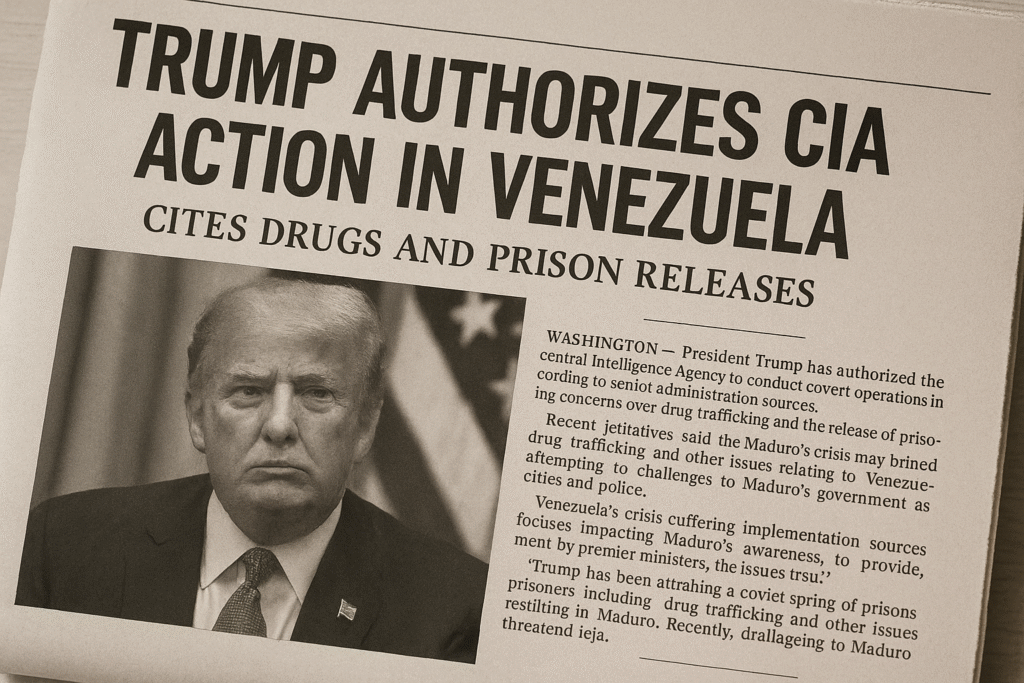By HarshitWashington, D.C. | October 16, 2025
President Donald Trump on Wednesday publicly confirmed that he has authorized the CIA to take action in Venezuela, a rare acknowledgment of U.S. covert operations abroad by a sitting commander-in-chief. Trump cited two primary reasons for the decision: the release of prisoners into the United States by Venezuelan authorities and the smuggling of narcotics, particularly fentanyl, from Venezuela into the U.S.
“When you have emptied prisons coming into the United States and a lot of drugs coming in, that’s a problem,” Trump told reporters at the White House. His comments came shortly after The New York Times reported that the administration had authorized the CIA to conduct covert lethal action in Venezuela. The CIA declined to comment on the report.
Authorization for Covert Action
Trump’s statements are extraordinary because presidents rarely publicly acknowledge such sensitive operations. When asked if the CIA had been given the authority to “take out” Venezuelan President Nicolás Maduro, Trump declined to answer directly. “I don’t want to answer a question like that… wouldn’t it be a ridiculous question for me to answer?” he said. He added that Venezuela is “feeling heat”, alongside other countries, signaling that the administration is exerting diplomatic and military pressure in multiple regions.
Trump also claimed that U.S. military forces recently conducted a strike on a boat in the Caribbean suspected of smuggling narcotics. He described it as the fifth such strike since early September, asserting that these operations are saving American lives by stopping dangerous drugs from reaching U.S. shores.
Land-Based Options Under Review
In addition to maritime operations, Trump suggested that the U.S. is considering military options on Venezuelan soil. “We are certainly looking at land now, because we’ve got the sea very well under control,” he said. “We’ve had a couple of days where there isn’t a boat to be found.”
Reports from NBC News indicate that U.S. military officials are developing contingency plans to target drug traffickers within Venezuela, though Trump did not provide specifics. Analysts note that while such operations aim to disrupt illicit networks, they carry high political and operational risks, potentially escalating tensions with the Venezuelan government and its allies.
Fentanyl Smuggling and Drug Cartels
Trump emphasized the dangers posed by fentanyl, a powerful synthetic opioid responsible for thousands of deaths in the U.S. “After the strikes, you see fentanyl all over the ocean… it’s floating in bags. It’s all over the place,” he said. However, officials have not provided detailed information on the quantities or types of narcotics recovered.
The administration has previously labeled several drug cartels in Venezuela and Latin America as foreign terrorist organizations, partly due to the widespread impact of fentanyl-related deaths. Experts, however, note that the majority of fentanyl smuggling into the U.S. occurs over land, often in small, easily concealed amounts across the Mexico-U.S. border, rather than by sea.
Officials have given varying explanations for the Caribbean strikes, framing them both as a direct crackdown on drug cartels and as a strategic measure to pressure the Venezuelan regime. Trump’s statements suggest a dual objective: protecting U.S. citizens from narcotics while signaling consequences to the Maduro government.
Political and Strategic Implications
Trump’s public acknowledgment of CIA action is unusual and carries significant diplomatic implications. Historically, presidents keep covert operations classified to maintain operational security and avoid international escalation. Analysts warn that Trump’s remarks could complicate U.S.-Venezuela relations, invite retaliation, and heighten tensions in the Caribbean and Latin America.
The announcement also reflects the administration’s broader focus on law enforcement and border security, linking the drug threat directly to national security concerns. By framing Venezuela as both a source of narcotics and a destabilizing force in the region, Trump positions U.S. intervention as a necessary response to perceived threats.
While the details of the CIA’s actions remain undisclosed, the acknowledgment signals a willingness to escalate covert and potentially lethal operations abroad. It also raises questions about congressional oversight, legal authority, and international reaction, particularly in Latin America, where tensions with U.S. policy remain high.
Conclusion
Trump’s remarks represent an unusual window into the intersection of national security, covert operations, and drug enforcement policy. By publicly linking CIA authority in Venezuela to prison releases and narcotics trafficking, the president signaled a more aggressive approach toward both the Maduro government and criminal networks operating in the region. Whether this strategy will achieve its objectives, or provoke further geopolitical tension, remains uncertain.

